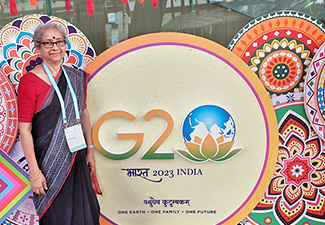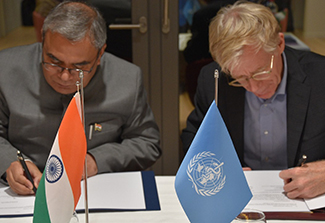Encouraging the circulation of knowledge between India and the West
January/February 2024 | Volume 23 Number 1
By Mariah Felipe
 Photo courtesy of Nandini KumarDr. Nandini Kumar attended the 2023 G20 summit in New Delhi, India, in September 2023.
Photo courtesy of Nandini KumarDr. Nandini Kumar attended the 2023 G20 summit in New Delhi, India, in September 2023.
Brain drain generally refers to the emigration of a group of educated individuals, often from lower-income countries to higher-income ones, in search of better economic opportunity and has long been a point of contention in the field of global health. While this phenomenon can have negative impacts, especially in countries in which the percentage of doctors is below WHO guidelines, this globalization of education, research, and medicine can also create a circulation of knowledge between two countries with differing cultures or resources.
This could not be more evident in India, a country with the world's largest population and diaspora, and a growing economy. Dr. Nandini Kumar, president of India’s Forum for Ethics Review Committees and distinguished scientist chair at India’s
Ministry of Ayurveda, Yoga and Naturopathy, Unani, Siddha, and Homeopathy (AYUSH), says while she still sees some “brain drain” in India, it’s started to become more of a circulation of knowledge with an influx in recent years of Indians coming back and non-Indians moving to the country to study and conduct research. “I know there’s always been this fear of brain drain, but in reality, there’s a place for everyone, everywhere,” says Kumar.
Kumar has a unique perspective on this topic as an expert in bioethics who was born in India, trained abroad, and returned to India to lead a bioethics training program that has trained thousands in India over the last two decades. She began her journey into the field in 2001 as one of the first trainees in Fogarty’s International Research Ethics Education and Curriculum Development Award (or Bioethics) program. One of the things she appreciates about Fogarty’s approach is that the center puts host nation researchers in charge. “I had a professor tell us, ‘I’ll teach you about the international bioethics concepts, but we need you to show us the context so that you can apply these concepts in a way that works for India.’” She says this inspired her as she designed her bioethics program to ensure that it captured “Indian-ness” while incorporating cultural and philosophical principles from Indian and Western cultures.
Kumar notes that this transition from brain drain to a “two-way street” in India is the result of huge shifts in recent years. Economic growth and changes in policy and education practices, among other factors, have led to a growth in opportunity in India encouraging many Indians to stay in the country and for others to return there for work.
Recent policies and guidelines are encouraging interdisciplinary clinical research and the integration of traditional medical systems with modern medicine. The current Indian government is behind the movement to converge traditional Indian medical practices, governed by AYUSH, with conventional Western medicine, creating more acceptance of traditional practices in hospitals and other settings.
 Photo courtesy of World Health OrganizationShri Indra Mani Pandey (left), representing AYUSH, and Dr. Bruce Aylward (right), representing WHO, sign an agreement in 2023 to advance traditional and complementary medicine.
Photo courtesy of World Health OrganizationShri Indra Mani Pandey (left), representing AYUSH, and Dr. Bruce Aylward (right), representing WHO, sign an agreement in 2023 to advance traditional and complementary medicine.
“The code of conduct for many of these practices protected by AYUSH was established hundreds of years ago, but the organization is now learning to adapt to the modern world, working to bring to the program more collaboration and cohesion between the two systems,” says Kumar.
Adaptions of this approach include official guidelines from AYUSH on the use of remedies to treat mild to moderate COVID-19, released in 2021, and a
recent publication in the
British Journal of Dermatology highlighting successful Ayurvedic treatments for filariasis and lymphedema.
Whether it is traditional or Western medicine that is being studied at home or abroad, Kumar asks her fellow researchers in the diaspora, in any field, to impart what they’ve learned to researchers in India, and to help build their research capacity through research or workshops, “because there are no global health issues that are confined to a particular geographical area. We have to learn from each other’s shortcomings and successes to grow.”
More Information
Updated February 14, 2024
To view Adobe PDF files,
download current, free accessible plug-ins from Adobe's website.
Related Fogarty Programs
Related World Regions / Countries
Related Global Health Research Topics